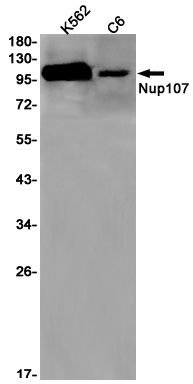
| WB | 1/500-1/1000 | Human,Mouse,Rat |
| IF | 咨询技术 | Human,Mouse,Rat |
| IHC | 咨询技术 | Human,Mouse,Rat |
| ICC | 技术咨询 | Human,Mouse,Rat |
| FCM | 咨询技术 | Human,Mouse,Rat |
| Elisa | 咨询技术 | Human,Mouse,Rat |
| Aliases | ODG6; NUP84; NPHS11; ODG6; GAMOS7 |
| Entrez GeneID | 57122 |
| WB Predicted band size | Calculated MW: 106 kDa; Observed MW: 106 kDa |
| Host/Isotype | Rabbit IgG |
| Antibody Type | Primary antibody |
| Storage | Store at 4°C short term. Aliquot and store at -20°C long term. Avoid freeze/thaw cycles. |
| Species Reactivity | Human,Rat |
| Immunogen | A synthetic peptide of human Nup107 |
| Formulation | Purified antibody in TBS with 0.05% sodium azide,0.05%BSA and 50% glycerol. |
+ +
以下是关于NUP107抗体的3篇代表性文献,按研究主题和抗体应用方向整理:
---
1. **文献名称**:*NUP107 controls meiotic entry through spatial regulation of CDC25B in oocytes*
**作者**:Braun et al. (2015), *Journal of Cell Biology*
**摘要**:研究揭示了NUP107在卵母细胞减数分裂中的作用,通过免疫荧光(IF)和Western blot(WB)技术验证NUP107抗体,发现其通过定位CDC25B调控细胞周期进程。
2. **文献名称**:*Disruption of nuclear pore complex subunits in human diseases*
**作者**:Christodoulou et al. (2010), *Nature Genetics*
**摘要**:系统分析核孔复合体(NPC)亚基(包括NUP107)的突变与人类疾病关联,使用NUP107抗体进行免疫组化(IHC)和共聚焦显微镜观察,发现其缺失导致胚胎发育异常及肾病综合征。
3. **文献名称**:*NUP107 is required for the assembly of the nuclear pore complex in Xenopus laevis*
**作者**:Harel et al. (2006), *Molecular Biology of the Cell*
**摘要**:利用非洲爪蟾卵母细胞模型,通过抗体介导的NUP107功能抑制实验,证明NUP107是NPC组装的关键因子,并参与核膜重塑过程。
---
**说明**:以上文献均以NUP107抗体为工具,涵盖功能机制、疾病关联及结构研究。若需实验细节(如抗体货号、物种来源),建议结合具体数据库(如CiteAb或PubMed)进一步筛选。
The NUP107 antibody is a crucial tool for studying the nuclear pore complex (NPC), a large protein assembly embedded in the nuclear envelope that regulates nucleocytoplasmic transport. NUP107 is a core component of the Nup107-160 subcomplex, which forms the structural scaffold of the NPC. This subcomplex, composed of multiple nucleoporins (e.g., NUP133. SEH1), plays essential roles in NPC assembly, mitotic progression, and chromatin organization. During mitosis, the Nup107-160 complex disassembles and redistributes to kinetochores, contributing to spindle assembly and the mitotic checkpoint.
NUP107 antibodies are widely used in immunofluorescence, immunoblotting, and immunoprecipitation to investigate NPC dynamics, nuclear transport defects, and cell cycle regulation. They help identify aberrations in NUP107 expression or localization linked to diseases such as cancer, primary ovarian insufficiency, and certain genetic disorders. For example, mutations in NUP107 are associated with steroid-resistant nephrotic syndrome, highlighting its role in maintaining renal filtration.
As a research reagent, NUP107 antibodies enable the study of NPC biogenesis, mitotic errors, and crosstalk between nuclear envelope integrity and cellular signaling pathways. Their specificity and validation in diverse models (e.g., human, mouse) make them indispensable for dissecting NPC-related mechanisms in health and disease.
×